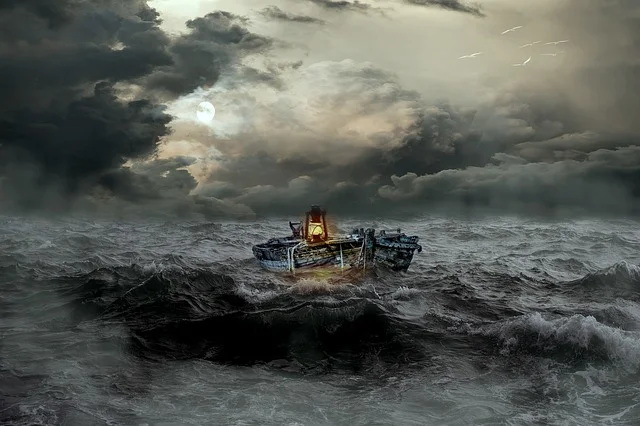Episode 13 of the podcast is now available and today’s podcast wraps up this month’s focus on communications. In this episode, I talk about the secret to great communications - not saying anything.
All in Strategy
We Aren't Mr. Spock
The thing about giving advice is that it’s super easy to do at a distance. You can look at the options in a cold and calculated fashion, weigh up the pros and cons, and make definite judgements about the right path forward.
We see this firsthand in any education forum - specifically, business schools like those I studied at - where the case method is utilized. You study a specific situation, whether it’s related to people, strategy, operations, etc. You analyze the variables based on the information available. And then you make a logical, rational decision on what it takes to solve the specific problem at hand. Easy stuff.
Owning Your Ground
In my last post, I talked about the importance of avoiding stasis in your strategy, that being comfortable with the middle ground is a straight path to irrelevance. Maybe not today, but certainly someday.
So a response - an active, progressive strategy to do something is absolutely essential. It’s essential to be on the front foot and proactively define a clear plan for continued success.
That doesn’t, however, have to mean going after the big boys head-to-head. It doesn’t necessarily mean trying to become THE market leader.
Stasis Is Not A Strategy
We tend to think of the middle ground as a safe space to be in. You’re not out on a limb at the bleeding edge, but you’re also not trailing the pack. There’s no bloodthirsty Coke versus Pepsi battle at play, but you’re also not spending your days fighting for survival.
It’s tempting to get comfortable there. You simply play your position, fight with other ‘middle of the road’ brands and focus on the ‘middle of the road’ customers
Fancy Offices And Free Snacks
Conversations about great company cultures are almost always accompanied by talk of nice offices with modern conveniences, bring-your-pet-to-work days, free food and more. In fact, read about the latest hot startup, and modern media (conventional or otherwise) will be abuzz with stories about the lengths these companies are going to for their employees (from no dress code to unlimited vacations to relaxation pods).
It’s not surprising then that these ideas become comingled: that amazing work culture goes hand in hand with these kinds of tangible amenities.
We Get Upset For A Reason
There’s a debate raging at the moment around the football club I support (Arsenal) as you whether they should replace the club’s manager of the last couple of years, Unai Emery.
Emery, for those who don’t know, replaced a club legend, Arsene Wenger, who managed the team for 22 years and brought us the greatest period in our history. He not only transformed the club but he transformed English football, in general.
From Ally To Accomplice
When you’re growing a business, it’s no surprise that you need friends who will advocate for you. I’ve relied on more than my fair share over the last 15 years as I’ve built the business - friends both outside the firm as well as within it - and they’ve been essential to the success that we’ve achieved.
A subset of these friends have gone above and beyond - they’ve truly put themselves out there for us. These are individuals who’ve (certainly in our early days) put their reputations on the line, or gone out of their way to help the firm, or given materially of their precious time to further our goals.
It's The People Stuff, Not The Technical Stuff
I was speaking with a client the other day about a specific change initiative they were about to implement.
The client’s team had been working off of a planning process that was individualized and not institutionalized, and hence, had different leaders at the same level working at different levels of depth and rigor, from the amount of data they utilized during that process to the quality of the analysis and output.
Not an entirely uncommon phenomenon in many big companies and one that had evolved over the years as a result of organic and inorganic growth. All the same, this was now leading to missed opportunities and a lack of true strategic alignment.
Getting Things (And Ourselves) To Change
We all have ideas about where things should ideally be in our lives. Our work should look like this, or our political situation should operate like that. Our relationships should function in this particular way or our personal friendships should manifest themselves differently.
We tend to pore over what these idealized end-states ought to look like - often in excruciating and emotional detail. But getting “there” can be extremely difficult, a journey where the path is entirely uncertain or, worse, impossible to traverse.
Experience In Retrospect
There’s a finality to endings that’s bittersweet.
The completion of the thing - especially something that’s absorbed us wholeheartedly and then come to some natural conclusion - almost always results in a mixture of emotions.
There’s the joy that comes from the experience (the good times, the contributions, the confirmations) which can be considerable and, at times, overwhelming. This joy is experienced both during but also in retrospect, once we’ve gained an appreciation of those aspects we may have taken for granted.
Why We Don’t “Do”
What it boils down to is this: there’s a legitimate fear that if we actually make something, we’ll have to face the true state of our skills and accept how much improvement we still have ahead of us” Chase Jarvis - Creative Calling
This is the hard part about creating - particularly for the very first time, when we’re trying something brand new.
When Having Too Much Money Is A Bad Thing
The recent WeWork debacle is an incredible business story that MBA students will be dissecting and analyzing for years to come.
How could a company that was expecting one of the richest, most high profile IPOs of recent times now be on the verge of bankruptcy - in barely a couple of months?
It seemed to have all the ingredients you’d want - a flamboyant founder who would often walk around Manhattan barefoot, a lofty mission about elevating our consciousness, a truly differentiated product offering and marketing buzz that the most storied brands would kill for.
It’s Available To You
One of the most common refrains I hear from business professionals - both young and old - is that the achievements of ‘celebrities’, in any walk of life, are the result of luck, or great timing, or some other reason that’s preordained.
In others words, their smarts and hard work were contributors but not drivers of their success. They rationalize that what drove that person’s success isn’t accessible to them, that they’re disproportionately benefitting from forces outside of their control.
"It Was Only Necessary To Sacrifice Everything"
This week, I’m sharing my favorite ideas from “A Million Miles In A Thousand Years”, an amazing book by Donald Miller. It’s a non-fiction book that speaks to how we should think of our lives as stories to be lived, making them more meaningful in terms of how we live it, and how we (and others) will remember ourselves as we grow older and when we eventually leave. This is Day 4.
Stories Without Risk Are Meaningless*
In my very early twenties, I went on my first business trip with my then boss. It was a quick trip to Bangkok (I was based in Hong Kong at the time) and I remember four things about that trip.
First, I got to fly business class, which was awesome. Business class was nice.
Second, I stayed at the Grand Hyatt Erawan, which was amazing. I couldn’t fathom such luxury.
Third, Bangkok traffic sucked - a 15 minute drive took an hour plus. Apparently, pretty normal back then (and not all that different now).
Born Versus Made
An endless debate that takes place in popular conversation is the question of whether people are born with special capabilities or whether they craft and mold themselves to become that way.
There’s a comfort in both streams of thought. The latter suggests that we control our destiny, who we are and who we can become. It provides for the mental foundation that we aren’t restricted to what we are today nor to what we have. Dream your dreams, make your plans and get after it. It’s all there for the taking.
Beliefs That Aren’t Our Own
For most of us, when we’re growing up, we’re exposed to plenty of structure. From our family rules to our religion to our social and community expectations, we’re guided (explicitly or implicitly) by defined sets of rules that tell us what to do, how to behave and even how to think.
“...Until You Get Punched In The Face...”
There are two types of people in the world: those who plan and those who don’t.
And there’s plenty of evidence to suggest that those who plan are more successful than those who don’t.
Of course, just because you plan, doesn’t mean everything will go your way. Reality has a funny way of doing things that don’t align with our best laid plans.
Unplug Yourself
“Almost everything will work again if you unplug it for a few minutes, including you.” — Anne Lamott
It’s almost always a bad idea to try and make difficult decisions in the fog of war, unless we absolutely have to.
In the midst of the battle, we’re faced with a host of messages and signals coming at us, non-stop, seemingly at random. Sometimes, our senses are heightened and we’re fully attuned to our circumstances, allowing us to make sharp, intuitive decisions. But more often than not, we’re not. Or we aren’t for any extended period of time.




















